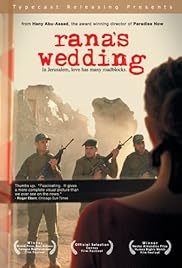RANA’S WEDDING (aka: ANOTHER DAY IN JERUSALEM)
(director: Hany Abu-Assad; screenwriters: Liana Badr/Ihab Lamey; cinematographer: Brigit Hillenius; editor: Denise Jansee; music: Bashar Abd Rabbou/Mariecke van der Linden; cast: Clara Khoury (Rana), Khalifa Natour (Khalil), Ismael Dabbag (Ramzy), Walid Abed Elsalam (Marriage Official), Zuher Fahoum (Abu Siad, Rana’s father), Bushra Karaman (Rana’s grandmother); Runtime: 90; MPAA Rating: NR; producers: Bero Beyer/George Ibrahim; Arab Film Distribution; 2002-Palestine-in Arabic with English subtitles)
“What’s interesting are the shots of daily life in East Jerusalem and how it’s seen through the eyes of the Arab heroine.”
Reviewed by Dennis Schwartz
A less than rosy outlook at the Israeli occupation of the Palestine territories, as directed by Palestinian filmmaker Hany Abu-Assad (“Paradise Now”/”Ford Transit”). It’s written byLiana Badr and Ihab Lamey.
It chronicles the predicament of the feisty 17-year-old Rana (Clara Khoury), who lives with her wealthy parents in occupied East Jerusalem. Her fatherAbu Siad (Zuher Fahoum) is moving to Cairo and has given her a choice,she can stay home and choose from a list of potential husbands selected by her father or she can travel to Egypt with her father to finish her studies. The headstrong Rana is in love with theater director Khalil (Khalifa Natour), a Palestinian who runs a theater in Ramalla, and wishes to make her own choice–so she chooses to marry Khalil.
Rana must unite with the free-spirited artistic Khalil before the 4 P.M. deadline, but the groom is unable to reach Jerusalem that night because of a bombing. They meet the next day and locate a registrar who they must convince to marry them. They also must convince her father that Khalil’s the right choice rather than the good-provider young professional men he has chosen. There’s gridlock in Jerusalem due to the roadblocks, closed borders, rock throwing Palestinian youths and the rigid Israeli authorities and their power plays, as the wedding story becomes an obvious metaphor for the hardship of life for those Palestinians who live in an occupied land. That the wedding does take place at the last minute despite both irritating and harrowing hassles, becomes a sign of hope–even if the wedding is held in a car on the road.
The slight story is eloquently told. What’s interesting are the shots of daily life in East Jerusalem and how it’s seen through the eyes of the Arab heroine. Some of the film’s grimness is removed by its unsettling comical moments and the sympathy laid on the earnest sweet young couple as the hope for a better future. Its final words, said over the credits, are from “State of Siege,” a militant poem by Mahmoud Darwish, that calls for ongoing Palestinian resistance and faith in the future.
It was shot on location in East Jerusalem, Ramallah and at checkpoints in-between.

REVIEWED ON 7/30/2011 GRADE: B